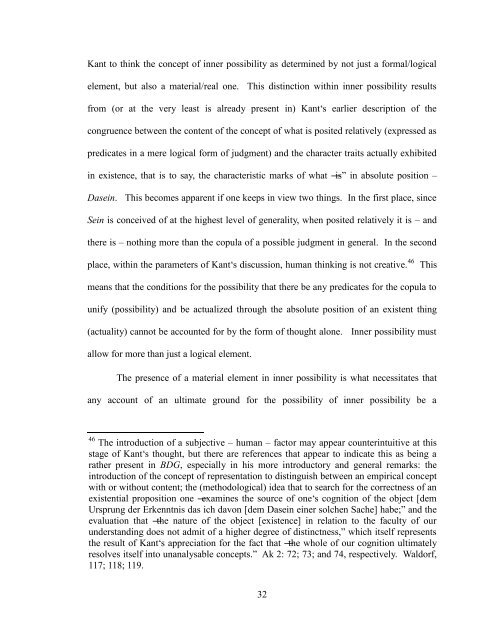The Doctrine of Self-positing and Receptivity in Kant's Late ...
The Doctrine of Self-positing and Receptivity in Kant's Late ...
The Doctrine of Self-positing and Receptivity in Kant's Late ...
Create successful ePaper yourself
Turn your PDF publications into a flip-book with our unique Google optimized e-Paper software.
Kant to th<strong>in</strong>k the concept <strong>of</strong> <strong>in</strong>ner possibility as determ<strong>in</strong>ed by not just a formal/logical<br />
element, but also a material/real one. This dist<strong>in</strong>ction with<strong>in</strong> <strong>in</strong>ner possibility results<br />
from (or at the very least is already present <strong>in</strong>) Kant‘s earlier description <strong>of</strong> the<br />
congruence between the content <strong>of</strong> the concept <strong>of</strong> what is posited relatively (expressed as<br />
predicates <strong>in</strong> a mere logical form <strong>of</strong> judgment) <strong>and</strong> the character traits actually exhibited<br />
<strong>in</strong> existence, that is to say, the characteristic marks <strong>of</strong> what ―is‖ <strong>in</strong> absolute position –<br />
Dase<strong>in</strong>. This becomes apparent if one keeps <strong>in</strong> view two th<strong>in</strong>gs. In the first place, s<strong>in</strong>ce<br />
Se<strong>in</strong> is conceived <strong>of</strong> at the highest level <strong>of</strong> generality, when posited relatively it is – <strong>and</strong><br />
there is – noth<strong>in</strong>g more than the copula <strong>of</strong> a possible judgment <strong>in</strong> general. In the second<br />
place, with<strong>in</strong> the parameters <strong>of</strong> Kant‘s discussion, human th<strong>in</strong>k<strong>in</strong>g is not creative. 46 This<br />
means that the conditions for the possibility that there be any predicates for the copula to<br />
unify (possibility) <strong>and</strong> be actualized through the absolute position <strong>of</strong> an existent th<strong>in</strong>g<br />
(actuality) cannot be accounted for by the form <strong>of</strong> thought alone. Inner possibility must<br />
allow for more than just a logical element.<br />
<strong>The</strong> presence <strong>of</strong> a material element <strong>in</strong> <strong>in</strong>ner possibility is what necessitates that<br />
any account <strong>of</strong> an ultimate ground for the possibility <strong>of</strong> <strong>in</strong>ner possibility be a<br />
46 <strong>The</strong> <strong>in</strong>troduction <strong>of</strong> a subjective – human – factor may appear counter<strong>in</strong>tuitive at this<br />
stage <strong>of</strong> Kant‘s thought, but there are references that appear to <strong>in</strong>dicate this as be<strong>in</strong>g a<br />
rather present <strong>in</strong> BDG, especially <strong>in</strong> his more <strong>in</strong>troductory <strong>and</strong> general remarks: the<br />
<strong>in</strong>troduction <strong>of</strong> the concept <strong>of</strong> representation to dist<strong>in</strong>guish between an empirical concept<br />
with or without content; the (methodological) idea that to search for the correctness <strong>of</strong> an<br />
existential proposition one ―exam<strong>in</strong>es the source <strong>of</strong> one‘s cognition <strong>of</strong> the object [dem<br />
Ursprung der Erkenntnis das ich davon [dem Dase<strong>in</strong> e<strong>in</strong>er solchen Sache] habe;‖ <strong>and</strong> the<br />
evaluation that ―the nature <strong>of</strong> the object [existence] <strong>in</strong> relation to the faculty <strong>of</strong> our<br />
underst<strong>and</strong><strong>in</strong>g does not admit <strong>of</strong> a higher degree <strong>of</strong> dist<strong>in</strong>ctness,‖ which itself represents<br />
the result <strong>of</strong> Kant‘s appreciation for the fact that ―the whole <strong>of</strong> our cognition ultimately<br />
resolves itself <strong>in</strong>to unanalysable concepts.‖ Ak 2: 72; 73; <strong>and</strong> 74, respectively. Waldorf,<br />
117; 118; 119.<br />
32


